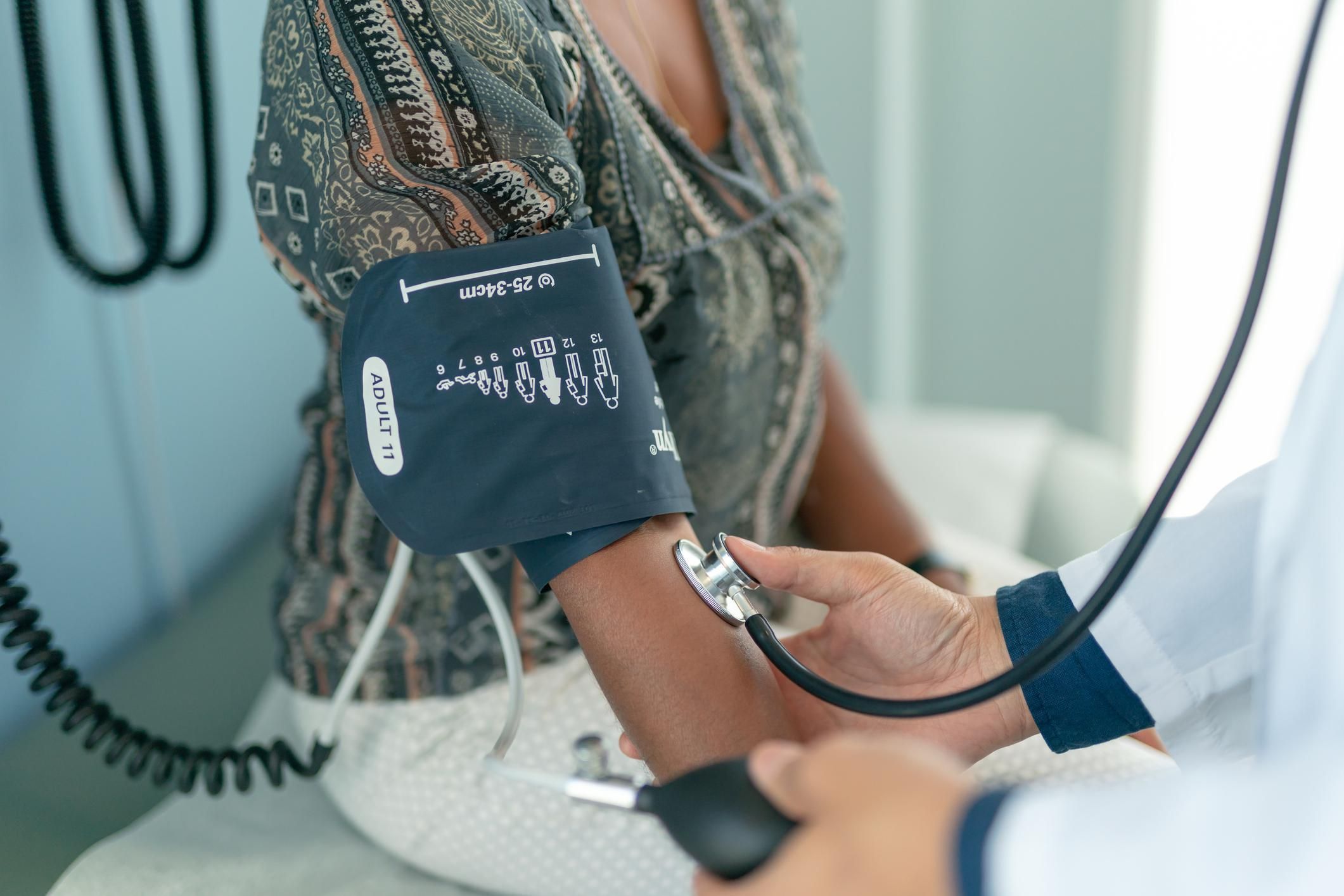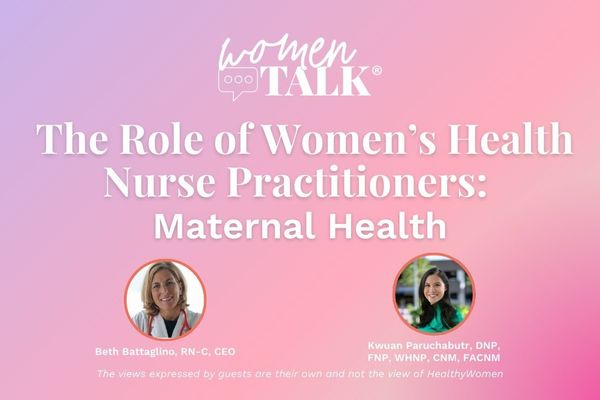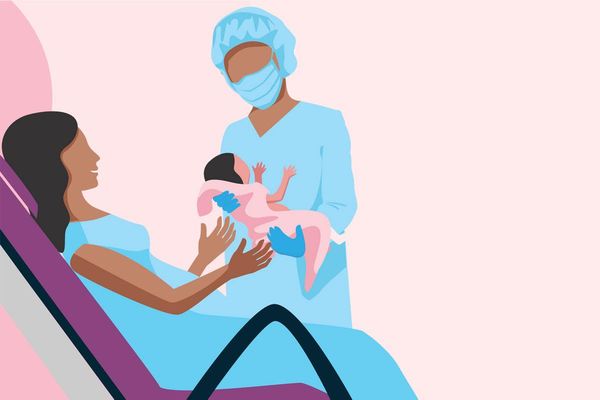On October 28, 2021, HealthyWomen hosted a free webinar, “Heart to Heart: How Pregnancy Can Affect Your Heart Health Throughout Your Life,” in partnership with the American Medical Women’s Association, Preeclampsia Foundation and Preventive Cardiovascular Nurses Association. Watch a recording of the webinar to learn more about the connection between pregnancy and long-term heart health.
When 42-year-old Bessie Cherry was pregnant with her son, Arlo, in 2018, she was diagnosed with gestational diabetes and monitored closely throughout her pregnancy. But after Arlo was born and her blood sugar returned to normal, no one mentioned her gestational diabetes — or the effect it could have on her future health — ever again.
In addition to making pregnancy more challenging, these complications may reveal an increased risk of certain serious diseases down the road. Yet, like many women, Cherry wasn’t told about the ways that “temporary” pregnancy complications such as gestational diabetes, preeclampsia and preterm birth can permanently affect health.
“Pregnancy is what we call a natural stress test for women,” said Erin Ferranti, Ph.D., assistant professor of nursing at the Nell Hodgson Woodruff School of Nursing at Emory University and participant in our Heart to Heart webinar. “We're not typically looking for heart disease and diabetes during women's reproductive years. But when a woman is pregnant, and physiologically stressed, any disease risks she may have show up.”
Even healthcare providers (HCPs) may not know about the increased risk of disease that comes with pregnancy complications, according to Dr. Judette Louis, chair of the Department of Obstetrics and Gynecology at University of South Florida and participant in our Heart to Heart webinar.
“We still have very far to go in terms of even the people who take care of these women knowing that there are risk factors for future heart disease that occur related to pregnancy,” Louis said. “So if the people who are taking care of you don't even know about it, then it makes it difficult for you as the patient to know about it.”
Although you may not hear about it from your HCP, the link between pregnancy complications and future health problems is a strong one. It’s important that women understand this connection — and what they can do about it.
Gestational diabetes is linked to Type 2 diabetes and cardiovascular disease
Gestational diabetes happens when the body can’t control blood sugar levels during pregnancy. Up to 60% of women with gestational diabetes will go on to develop Type 2 diabetes. Many may also go on to develop heart problems.
An analysis of nine studies including more than 5 million women found those who had gestational diabetes were twice as likely to experience a future cardiovascular event as women who didn’t have gestational diabetes, regardless of whether they went on to develop Type 2 diabetes.
Another analysis of more than 1,000 women found a history of gestational diabetes doubled the risk of heart artery calcification — a marker of increased heart disease risk — many years after pregnancy, even if blood sugar returned to normal levels.

Gestational diabetes can increase your risk of high blood pressure and preeclampsia, a complication involving high blood pressure that may include kidney and/or liver damage. Preeclampsia can be fatal for both mother and baby if left untreated, and the most effective way to treat it is delivery of the baby as soon as possible.
Even after delivering her baby, a woman may experience lingering symptoms of preeclampsia — and an increased risk of heart problems later in life. Preeclampsia doubles your risk of heart disease and stroke and quadruples your risk of high blood pressure, according to the Preeclampsia Foundation.
A 2020 study of more than 500,000 women found those who had preeclampsia during a single pregnancy were twice as likely to have heart failure in the future. For women who developed preeclampsia in more than one pregnancy, their risk of heart failure quadrupled.
Gestational hypertension, or high blood pressure during pregnancy, is also associated with an increased risk of cardiovascular disease.
Delivering early can increase cardiovascular risk, too
Preterm birth, when a baby is born before the 37th week of pregnancy, affects about one in 10 pregnancies in the United States — and it’s another risk factor for heart disease and stroke. One analysis found that women who delivered preterm had 2.5 times the risk of developing heart disease within 10 years compared with women with full-term births (39-41 weeks). For women who delivered extremely early (22-27 weeks), the risk was four times higher.
Five ways to lower your risk of heart problems after pregnancy complications

While the statistics around pregnancy complications and disease risk are startling, future health problems are far from a foregone conclusion. “Just because risk factors exist does not mean that particular conditions, like diabetes or heart problems, will develop — but it does increase the chances,” said Emily J. Jones, Ph.D., associate professor at the Fran and Earl Ziegler College of Nursing at the University of Oklahoma and participant in our Heart to Heart webinar. “Importantly, it signals that now is the optimal time to take action that could help prevent heart problems later in life.”
Here are some steps you can take today to lower your risk of cardiovascular disease in the future.
1. Talk to your HCP
“I think the first step is having a conversation with whomever provides your primary care, to let them know that you had complications in pregnancy and to talk about your individual plan to reduce your risk for heart disease,” Louis said.
Jones agrees that talking to your HCP about your risk factors is key. “It’s really important that women who have gestational diabetes or preeclampsia feel empowered to talk about their future heart health with care providers,” Jones said. “Acknowledging that heart disease risk factors exist and making a prevention plan together is the priority.”
2. Consider breastfeeding
“We talk about how healthy breastfeeding is for babies, but it's also super healthy for mom,” Ferranti said. “Not only does it help with weight loss for some women, but it uses up mom’s stored glucose.” This helps to regulate blood sugar, she explained, and decreases the mother’s risk of developing diabetes down the road.
3. Focus on heart-healthy foods
Jones believes adjusting your diet is a relatively simple way to take charge of your heart health. “Focusing on choosing heart-healthy whole grains and fats (like olive oil) and opting for fruits and vegetables over simple carbs and unhealthy fats often found in processed foods is a great start,” she said.
4. Reframe your approach to exercise
Regular exercise is critical for heart health, but Jones recognizes how difficult it can be for busy and exhausted moms to fit in a workout. “Maybe reframing this important health need as mindful movement can be helpful here,” she said. “How can we move our bodies in strategic ways that fit into our daily lives and contribute to our ability to live our best lives?”
5. Seek support
“Connecting in meaningful ways with people we love can foster feelings of well-being and good energy,” Jones said. She adds that having the support of a friend or partner often makes it easier (and more fun!) to embrace new, heart-healthy habits.
Resources:
Preeclampsia Foundation
MoMMA’s (Maternal Mortality and Morbidity Advocates) Voices
American College of Obstetricians and Gynecologists
- Clinically Speaking: Questions to Ask Your HCP About ... ›
- It's Not Just Your Mother's Heart Disease: Why Heart Disease Is ... ›
- Heart Health During Pregnancy and Beyond - HealthyWomen ›
- Black Women Face Double the Risk of Pregnancy-Related Heart ... ›
- FAQs on Gestational Diabetes - HealthyWomen ›







